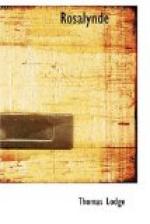“By my faith,” quoth Aliena, “sir, you are deep read in love, or grows your insight into affection by experience? Howsoever, you are a great philosopher in Venus’ principles, else could you not discover her secret aphorisms. But, sir, our country amours are not like your courtly fancies, nor is our wooing like your suing; for poor shepherds never plain them till love pain them, where the courtier’s eyes is full of passions, when his heart is most free from affection; they court to discover their eloquence, we woo to ease our sorrows; every fair face with them must have a new fancy sealed with a forefinger kiss and a far-fetched sigh, we here love one and live to that one so long as life can maintain love, using few ceremonies because we know few subtleties, and little eloquence for that we lightly account of flattery; only faith and troth, that’s shepherd’s wooing; and, sir, how like you of this?”
“So,” quoth Saladyne, “as I could tie myself to such love.”
“What, and look so low as a shepherdess, being the son of Sir John of Bordeaux? Such desires were a disgrace to your honors.” And with that surveying exquisitely every part of him, as uttering all these words in a deep passion, she espied the paper in his bosom; whereupon growing jealous that it was some amorous sonnet, she suddenly snatched it out of his bosom and asked if it were any secret. She was bashful, and Saladyne blushed, which she perceiving, said:
“Nay then, sir, if you wax red, my life for yours ’tis some love-matter: I will see your mistress’ name, her praises, and your passions.” And with that she looked on it, which was written to this effect:
Saladyne’s Sonnet
If it be true that heaven’s
eternal course
With restless sway and ceaseless
turning glides;
If air inconstant be, and
swelling source
Turn and returns with many
fluent tides;
If earth in winter
summer’s pride estrange,
And nature seemeth
only fair in change;
If it be true that our immortal
spright,
Derived from heavenly pure,
in wand’ring still,
In novelty and strangeness
doth delight,
And by discoverent power discerneth
ill;
And if the body
for to work his best
Doth with the
seasons change his place of rest;
Whence comes it that, enforced
by furious skies,
I change both place and soil,
but not my heart,
Yet salve not in this change
my maladies?
Whence grows it that each
object works my smart?
Alas, I see my
faith procures my miss,
And change in
love against my nature is.
Et florida pungunt.
Aliena having read over his sonnet, began thus pleasantly to descant upon it:
“I see, Saladyne,” quoth she, “that as the sun is no sun without his brightness, nor the diamond accounted for precious unless it be hard, so men are not men unless they be in love; and their honors are measured by their amours, not their labors, counting it more commendable for a gentleman to be full of fancy, than full of virtue. I had thought




